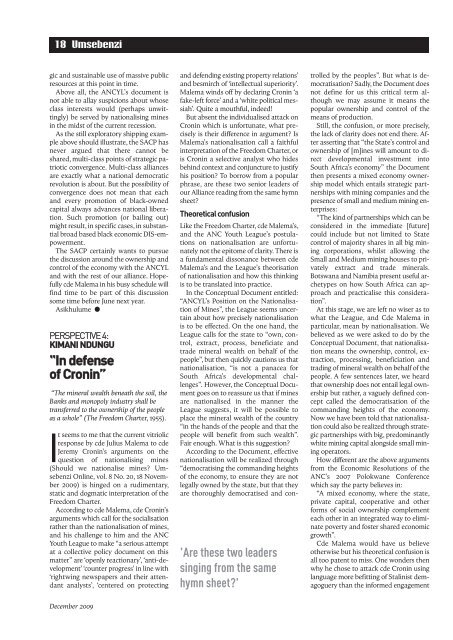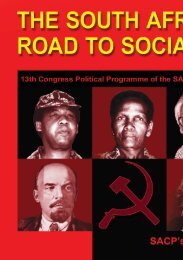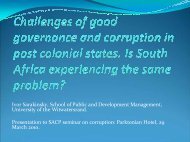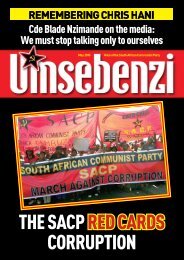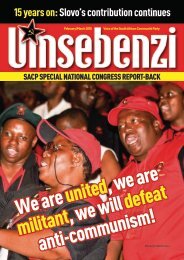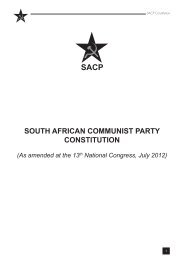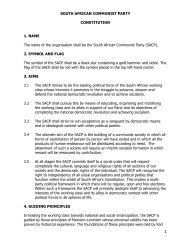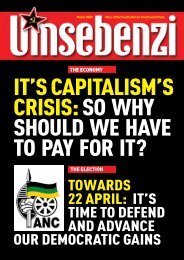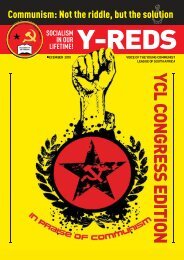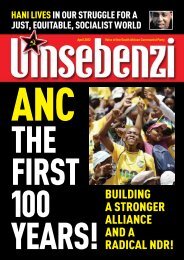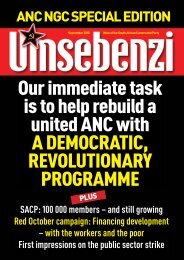Forward to Socialism!! - South African Communist Party
Forward to Socialism!! - South African Communist Party
Forward to Socialism!! - South African Communist Party
You also want an ePaper? Increase the reach of your titles
YUMPU automatically turns print PDFs into web optimized ePapers that Google loves.
18 Umsebenzi<br />
gic and sustainable use of massive public<br />
resources at this point in time.<br />
Above all, the ANCYL’s document is<br />
not able <strong>to</strong> allay suspicions about whose<br />
class interests would (perhaps unwittingly)<br />
be served by nationalising mines<br />
in the midst of the current recession.<br />
As the still explora<strong>to</strong>ry shipping example<br />
above should illustrate, the SACP has<br />
never argued that there cannot be<br />
shared, multi-class points of strategic patriotic<br />
convergence. Multi-class alliances<br />
are exactly what a national democratic<br />
revolution is about. But the possibility of<br />
convergence does not mean that each<br />
and every promotion of black-owned<br />
capital always advances national liberation.<br />
Such promotion (or bailing out)<br />
might result, in specific cases, in substantial<br />
broad based black economic DIS-empowerment.<br />
The SACP certainly wants <strong>to</strong> pursue<br />
the discussion around the ownership and<br />
control of the economy with the ANCYL<br />
and with the rest of our alliance. Hopefully<br />
cde Malema in his busy schedule will<br />
find time <strong>to</strong> be part of this discussion<br />
some time before June next year.<br />
Asikhulume<br />
PERSPECTIVE 4:<br />
KIMANI NDUNGU<br />
“In defense<br />
of Cronin”<br />
“The mineral wealth beneath the soil, the<br />
Banks and monopoly industry shall be<br />
transferred <strong>to</strong> the ownership of the people<br />
as a whole” (The Freedom Charter, 1955).<br />
It seems <strong>to</strong> me that the current vitriolic<br />
response by cde Julius Malema <strong>to</strong> cde<br />
Jeremy Cronin’s arguments on the<br />
question of nationalising mines<br />
(Should we nationalise mines? Umsebenzi<br />
Online, vol. 8 No. 20, 18 November<br />
2009) is hinged on a rudimentary,<br />
static and dogmatic interpretation of the<br />
Freedom Charter.<br />
According <strong>to</strong> cde Malema, cde Cronin’s<br />
arguments which call for the socialisation<br />
rather than the nationalisation of mines,<br />
and his challenge <strong>to</strong> him and the ANC<br />
Youth League <strong>to</strong> make “a serious attempt<br />
at a collective policy document on this<br />
matter” are ‘openly reactionary’, ‘anti-development’<br />
‘counter progress’ in line with<br />
‘rightwing newspapers and their attendant<br />
analysts’, ‘centered on protecting<br />
and defending existing property relations’<br />
and besmirch of ‘intellectual superiority’.<br />
Malema winds off by declaring Cronin ‘a<br />
fake-left force’ and a ‘white political messiah’.<br />
Quite a mouthful, indeed!<br />
But absent the individualised attack on<br />
Cronin which is unfortunate, what precisely<br />
is their difference in argument? Is<br />
Malema’s nationalisation call a faithful<br />
interpretation of the Freedom Charter, or<br />
is Cronin a selective analyst who hides<br />
behind context and conjuncture <strong>to</strong> justify<br />
his position? To borrow from a popular<br />
phrase, are these two senior leaders of<br />
our Alliance reading from the same hymn<br />
sheet?<br />
Theoretical confusion<br />
Like the Freedom Charter, cde Malema’s,<br />
and the ANC Youth League’s postulations<br />
on nationalisation are unfortunately<br />
not the epi<strong>to</strong>me of clarity. There is<br />
a fundamental dissonance between cde<br />
Malema’s and the League’s theorisation<br />
of nationalisation and how this thinking<br />
is <strong>to</strong> be translated in<strong>to</strong> practice.<br />
In the Conceptual Document entitled:<br />
“ANCYL’s Position on the Nationalisation<br />
of Mines”, the League seems uncertain<br />
about how precisely nationalisation<br />
is <strong>to</strong> be effected. On the one hand, the<br />
League calls for the state <strong>to</strong> “own, control,<br />
extract, process, beneficiate and<br />
trade mineral wealth on behalf of the<br />
people”, but then quickly cautions us that<br />
nationalisation, “is not a panacea for<br />
<strong>South</strong> Africa’s developmental challenges”.<br />
However, the Conceptual Document<br />
goes on <strong>to</strong> reassure us that if mines<br />
are nationalised in the manner the<br />
League suggests, it will be possible <strong>to</strong><br />
place the mineral wealth of the country<br />
“in the hands of the people and that the<br />
people will benefit from such wealth”.<br />
Fair enough. What is this suggestion?<br />
According <strong>to</strong> the Document, effective<br />
nationalisation will be realized through<br />
“democratising the commanding heights<br />
of the economy, <strong>to</strong> ensure they are not<br />
legally owned by the state, but that they<br />
are thoroughly democratised and con-<br />
'Are these two leaders<br />
singing from the same<br />
hymn sheet?'<br />
trolled by the peoples”. But what is democratisation?<br />
Sadly, the Document does<br />
not define for us this critical term although<br />
we may assume it means the<br />
popular ownership and control of the<br />
means of production.<br />
Still, the confusion, or more precisely,<br />
the lack of clarity does not end there. After<br />
asserting that “the State’s control and<br />
ownership of [m]ines will amount <strong>to</strong> direct<br />
developmental investment in<strong>to</strong><br />
<strong>South</strong> Africa’s economy” the Document<br />
then presents a mixed economy ownership<br />
model which entails strategic partnerships<br />
with mining companies and the<br />
presence of small and medium mining enterprises:<br />
“The kind of partnerships which can be<br />
considered in the immediate [future]<br />
could include but not limited <strong>to</strong> State<br />
control of majority shares in all big mining<br />
corporations, whilst allowing the<br />
Small and Medium mining houses <strong>to</strong> privately<br />
extract and trade minerals.<br />
Botswana and Namibia present useful archetypes<br />
on how <strong>South</strong> Africa can approach<br />
and practicalise this consideration”.<br />
At this stage, we are left no wiser as <strong>to</strong><br />
what the League, and Cde Malema in<br />
particular, mean by nationalisation. We<br />
believed as we were asked <strong>to</strong> do by the<br />
Conceptual Document, that nationalisation<br />
means the ownership, control, extraction,<br />
processing, beneficiation and<br />
trading of mineral wealth on behalf of the<br />
people. A few sentences later, we heard<br />
that ownership does not entail legal ownership<br />
but rather, a vaguely defined concept<br />
called the democratisation of the<br />
commanding heights of the economy.<br />
Now we have been <strong>to</strong>ld that nationalisation<br />
could also be realized through strategic<br />
partnerships with big, predominantly<br />
white mining capital alongside small mining<br />
opera<strong>to</strong>rs.<br />
How different are the above arguments<br />
from the Economic Resolutions of the<br />
ANC’s 2007 Polokwane Conference<br />
which say the party believes in:<br />
“A mixed economy, where the state,<br />
private capital, cooperative and other<br />
forms of social ownership complement<br />
each other in an integrated way <strong>to</strong> eliminate<br />
poverty and foster shared economic<br />
growth”.<br />
Cde Malema would have us believe<br />
otherwise but his theoretical confusion is<br />
all <strong>to</strong>o patent <strong>to</strong> miss. One wonders then<br />
why he chose <strong>to</strong> attack cde Cronin using<br />
language more befitting of Stalinist demagoguery<br />
than the informed engagement<br />
December 2009


